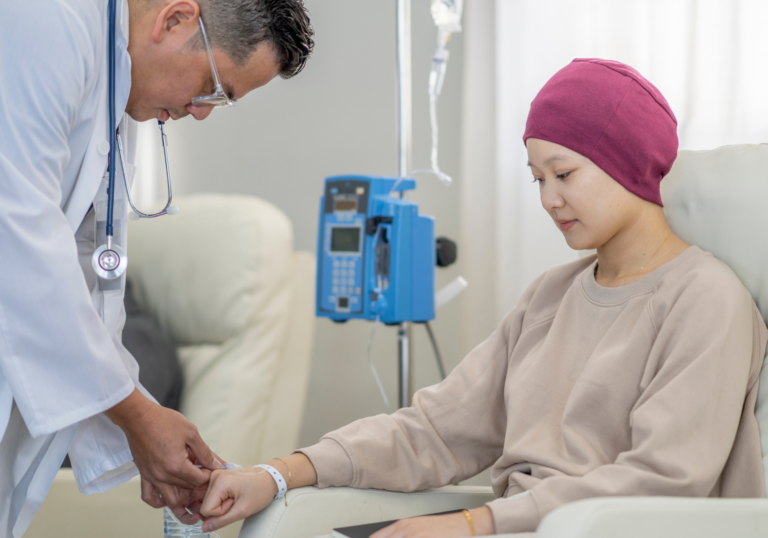18 Apr What is Immunotherapy?
What Is Immunotherapy?

Immunotherapy is a type of medical treatment that uses the body’s own immune system to fight diseases like cancer, by stimulating or enhancing the body’s natural defense mechanisms.
Immunotherapy is a type of cancer treatment that harnesses the power of the immune system to fight cancer cells. It works by stimulating the body’s natural defenses to recognize and attack cancer cells. It has shown to be especially promising when used in tandem with traditional cancer treatments such as chemotherapy.
What Is Immunotherapy?
The immune system is our body’s natural defense against foreign invaders such as viruses, bacteria, and cancer cells. However, cancer cells can evade detection by the immune system, allowing them to grow and spread. Immunotherapy works by boosting the immune system’s ability to recognize and attack cancer cells.
There are several types of immunotherapies, including checkpoint inhibitors and CAR-T cell therapy. Each both in a slightly different way, but they all aim to enhance the immune system’s ability to fight cancer.

Checkpoint inhibitors: Cancer cells often produce proteins that inhibit the immune system’s response to them. Checkpoint inhibitors work by blocking these proteins, allowing the immune system to recognize and attack cancer cells. This type of therapy is often used to treat melanoma, lung cancer, bladder cancer, and kidney cancer.
CAR-T cell therapy: This therapy involves modifying a patient’s own T cells (a type of white blood cell) in a laboratory to recognize and attack cancer cells. The modified T cells are then infused back into the patient’s bloodstream, where they can seek out and destroy cancer cells. This type of therapy has shown promising results in the treatment of certain types of blood cancers.
Chemotherapy and Immunotherapy
Chemotherapy is a commonly used cancer treatment that uses drugs to kill rapidly dividing cancer cells. However, chemotherapy can also harm healthy cells and cause side effects. This is where immunotherapy comes in. By pairing these two treatments, doctors can potentially enhance the effectiveness of both while minimizing side effects.
Immunotherapy can work with chemotherapy by targeting different aspects of the cancer cells. Chemotherapy drugs are designed to kill cancer cells directly, while immunotherapy can stimulate the immune system to identify and attack cancer cells. This combined approach can increase the likelihood of killing cancer cells that may have otherwise been resistant to chemotherapy alone.
Immunotherapy can also help fight against cancer by reducing the likelihood of cancer recurrence. While chemotherapy can be effective in killing cancer cells, it may not be able to destroy every cancer cell in the body. By pairing these two treatments, doctors can boost the immune system’s ability to identify and kill any remaining cancer cells, reducing the risk of recurrence.
Additionally, the side effects of chemotherapy may be reduced by immunotherapy. Chemotherapy can harm healthy cells, including those that make up the immune system. This can weaken the immune system, leaving patients vulnerable to infections and other illnesses. Immunotherapy can help bolster the immune system, potentially reducing the severity of these side effects.
Finally, pairing these treatments can improve the overall effectiveness of cancer treatment. Studies have shown that patients who receive both types of treatment may have better outcomes than those who receive only chemotherapy or only immunotherapy. This is particularly true for certain types of cancer, such as lung cancer and melanoma.
What are the side effects?
Like any medical treatment, Immunotherapy can have side effects. The side effects can vary depending on the type of therapy used, the dose, the patient’s health status, and other factors. Some common side effects include:
- Fatigue: Patients may experience tiredness, weakness, and lack of energy.
- Skin reactions: Patients may experience various skin reactions such as rash, itching, and blistering.
- Digestive issues: It is fairly common to experience digestive problems such as nausea, vomiting, diarrhea, and loss of appetite.
- Respiratory issues: Some treatments can cause shortness of breath, coughing, or wheezing.
- Flu-like symptoms: Another common side effect is flu-like symptoms such as fever, chills, muscle aches, and headache.
- Endocrine problems: one treatments can also affect the endocrine system, leading to hormonal imbalances and related side effects such as weight gain or loss, changes in blood sugar levels, and thyroid disorders.
- Immune-related side effects: The immune system can attack healthy cells and tissues, leading to immune-related side effects such as inflammation of the lungs, liver, or colon.
It’s important to note that while immunotherapy can have side effects, they are generally less severe than those associated with chemotherapy or radiation therapy. In addition, the side effects of immunotherapy usually subside after the treatment is complete.
Patients should inform their healthcare provider about any side effects they experience and seek medical attention if they are severe or persistent. Your healthcare provider can also provide guidance on how to manage or prevent these side effects.
Where Can I Get Treatment?
At Pure Infusion Suites, we put our patients first. We offer flexible scheduling, co-pay assistance, and other financial aid programs, as well as private suites equipped with recliners, flatscreen TVs, and snacks and drinks for you and your loved ones to enjoy.
Pure Infusion Suites currently has locations in Colorado, Idaho, Montana, and Utah offering oncology care. Our founders created Pure Infusion Suites to make the infusion process comfortable, streamlined, and affordable.
Our expertly trained staff will be with you throughout the infusion process to ensure easy referrals and insurance authorizations and reduce the cost of your infusion where we can.
At Pure Infusion Suites, you will skip the long lines at the hospital and be provided with your suite, where you can enjoy your favorite shows, snacks, and food during your infusion appointment.
If you have been prescribed immunotherapy during their cancer journey and are looking for a patient-focused infusion experience, call us at 855.550.3358.
Sorry, the comment form is closed at this time.